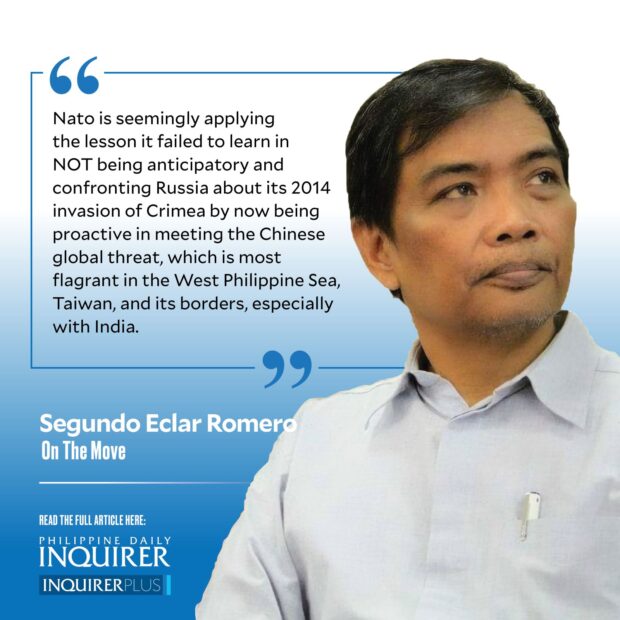Nato at the Indo-Pacific doorstep
 China’s assertive expansionism has begun to reap the whirlwind. Not only has the United States finally gotten the formula and spirit of its pivot to Asia right. Now it has inspired the other Western powers to rally behind it where they never imagined they’d tread before. Nikkei reports that the North Atlantic Treaty Organization (Nato) plans to open a “liaison office” in Tokyo, the first of its kind in Asia. The only other places where Nato has liaison offices are the United Nations (UN) in New York, the Organization for Security and Cooperation in Europe in Vienna, and in Ukraine, Georgia, Bosnia and Herzegovina, and Kuwait.
China’s assertive expansionism has begun to reap the whirlwind. Not only has the United States finally gotten the formula and spirit of its pivot to Asia right. Now it has inspired the other Western powers to rally behind it where they never imagined they’d tread before. Nikkei reports that the North Atlantic Treaty Organization (Nato) plans to open a “liaison office” in Tokyo, the first of its kind in Asia. The only other places where Nato has liaison offices are the United Nations (UN) in New York, the Organization for Security and Cooperation in Europe in Vienna, and in Ukraine, Georgia, Bosnia and Herzegovina, and Kuwait.
Nato was established in 1949 as a military alliance among North American and European countries to provide collective defense against potential Soviet aggression during the Cold War. Today, it is a political and military alliance that includes 31 member countries, whose core values include the promotion of democracy, individual liberty, and the rule of law. The challenges facing Nato today emanate outside of Europe—Russia (geographically more Asian than European) and China.
Japan is not a “North Atlantic” country, one might say. Sure, but it is the character of being a “Western democracy” that is more definitive and relevant. Geography takes second fiddle to ideology. And Japan has been, for a long time, committed to the core values of Western democracy, as has South Korea. And Australia and New Zealand. Oh, and Taiwan!
The desire to open new channels of cooperation goes both ways. Japan plans to create an independent diplomatic mission to Nato, separate from its mission in Belgium. This marks a sea change in defense cooperation among Western democracies. The bilateral partnership is crafted under a rubric called the Individually Tailored Partnership Programme addressing cyber threats, emerging and disruptive technologies, and disinformation, leading to the Nato Summit in Vilnius, Lithuania, on July 11-12. This mode of deepening cooperation could be the mold of engagement for the Asia-Pacific Four—Japan, South Korea, Australia, and New Zealand, who were also at last year’s Nato Summit in Madrid.
These same countries—the United States, United Kingdom, France, Australia, New Zealand, the Philippines, Thailand, and Pakistan—were the powers behind the Southeast Asian Treaty Organization (SEATO) established in 1954 to provide collective defense against the spread of communism (domino theory) following the French defeat in Indochina. SEATO eventually folded up in 1977 after the US lost the Vietnam War and the SEATO’s reason for being vanished.
The Nato move into the Indo-Pacific could be different. There is no attempt to make this new engagement look surreptitious or symbolic. It is meant to be “very visible, a real way to strengthen the relations between Japan and Nato” as the Danish ambassador to Japan puts it, according to Nikkei. That could only be a signal in the direction of China.
Nato is seemingly applying the lesson it failed to learn in NOT being anticipatory and confronting Russia about its 2014 invasion of Crimea by now being proactive in meeting the Chinese global threat, which is most flagrant in the West Philippine Sea, Taiwan, and its borders, especially with India.
The biggest accomplishment of Russia in its invasion of Ukraine is demonstrating that the United Nations as the global collective security system born of World War II has become inutile. The grotesque imagery of Russian Foreign Minister Sergey Lavrov presiding over the UN Security Council last month made a carnival of the absurdity of the UN. More than Ukraine, the credibility of the UN has become the greatest casualty of Putin’s invasion of Ukraine. Is Nato a preview of the next metamorphosis of the UN as a collective security system, the same way the UN built on the ashes of the League of Nations?
Nato with Japan, South Korea, Australia, New Zealand, and India in an effective operational partnership against Chinese expansionism may enable the Communist Party of China to rethink its strategy toward Taiwan and the West Philippine Sea and other irritants it has introduced in the Indo-Pacific region.
So far, China has cautioned Russia against the resort to nuclear weapons in its war against Ukraine. Its anemic efforts to carve a peacemaker role nevertheless augur well for the possibility of China’s stepping back from the brink of its aggressive stance toward Taiwan. To snatch is to push away—Finland and Sweden had maintained their neutrality over decades. The moment of Russian aggression was when they concluded that joining Nato was the most prudent move in their self-interest.
doyromero@gmail.com




















